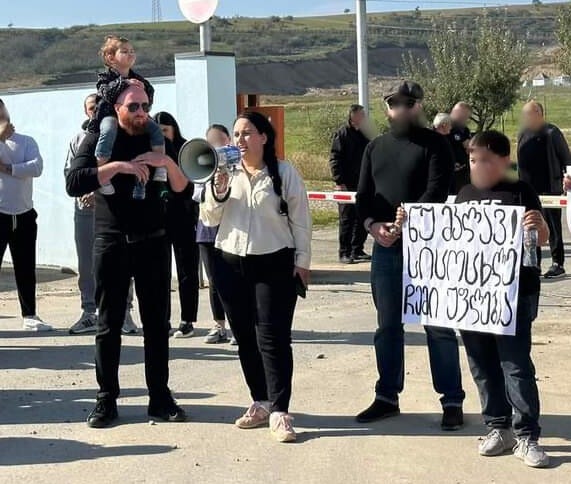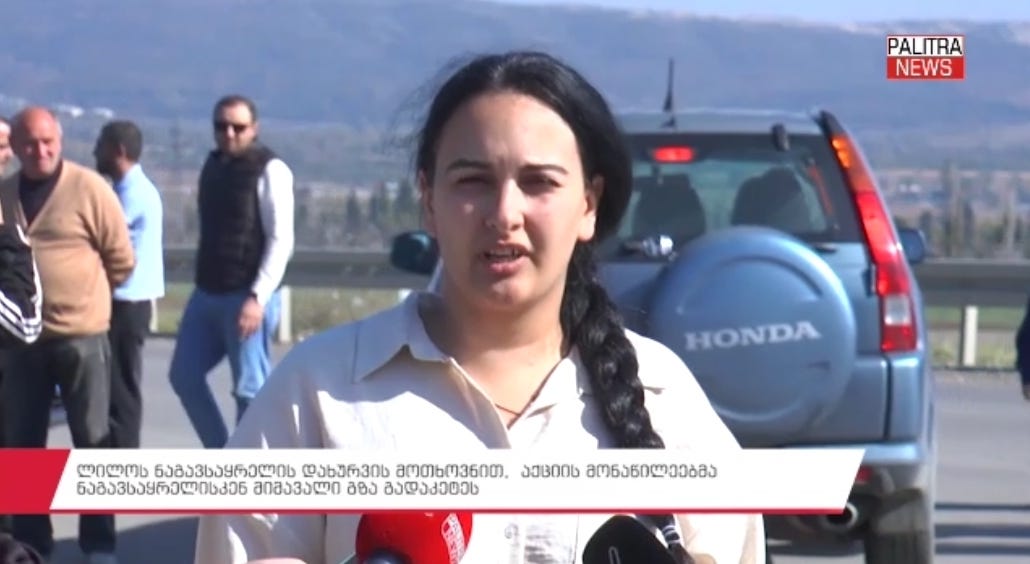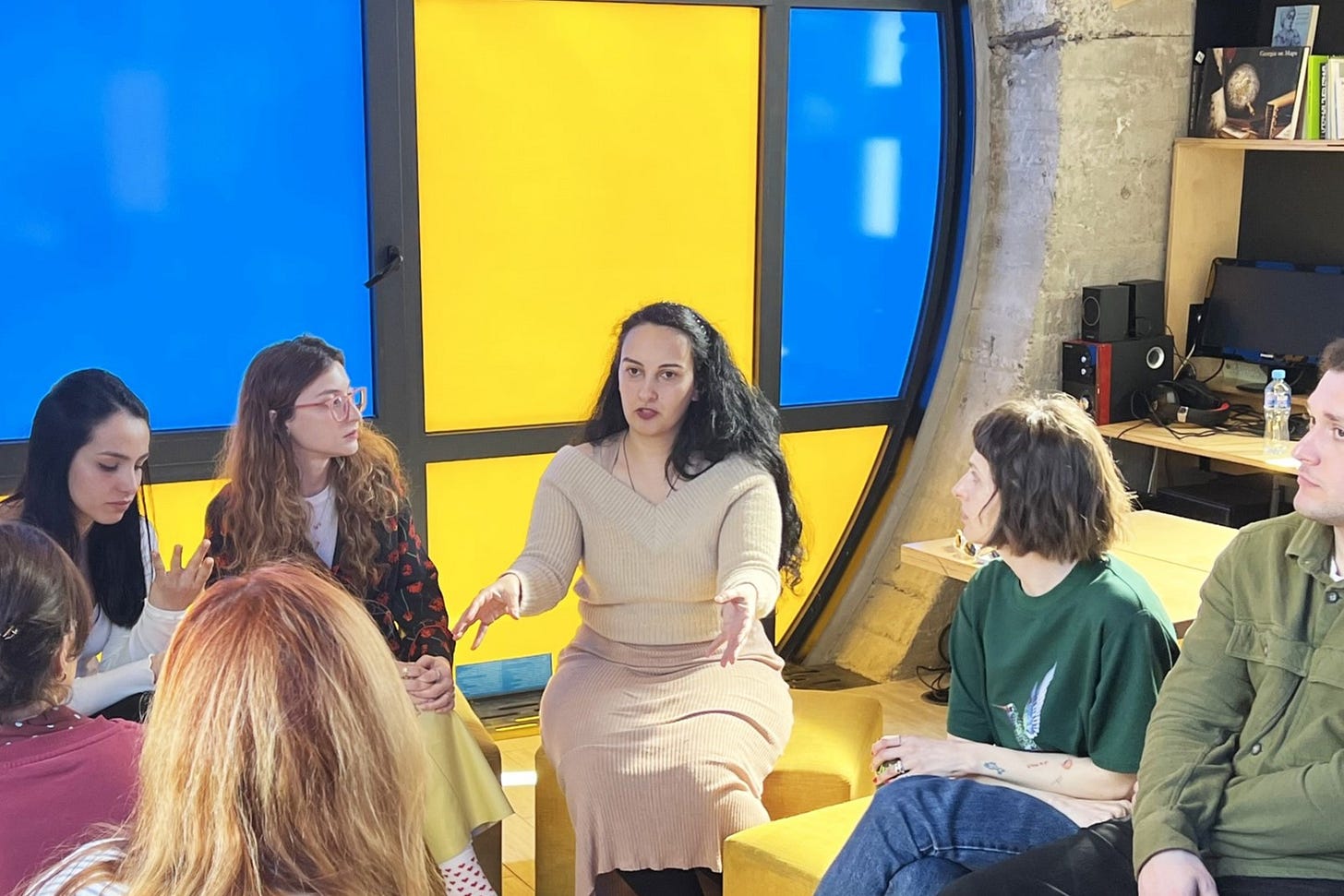Livestreaming from the Didi Lilo Landfill
A conversation with Kristine Gabisonia, the founder of the ‘Against Didi Lilo Landfill’ movement.
We are sharing stories of environmental optimism, perseverance, community-building, and experimentation in Georgia and the region. Kristine Gabisonia, an ecological activist in a town on the outskirts of Georgia’s capital, spoke to Ruderal intern Philippa Gercke to discuss her work, the challenges and opportunities of being a woman in activism, and the power of setting a precedent.
Kristine Gabisonia is an ecological activist, entrepreneur, teacher, mother of three, and neighbor of the Didi Lilo landfill. Her fight against the pollution caused by the landfill’s long-term mismanagement and its direct impacts on neighboring populations began in 2023.
It continues, with Gabisonia heading a group uniting local residents in their determination to improve the environment that they live in and hold local government accountable.
In April 2024, I met with Gabisonia to discuss her campaign.
Hi Kristine. First of all, can you give us an insight into the current situation at the Didi Lilo landfill and its impact on neighboring settlements?
The Didi Lilo landfill has been operating in violation of regulations for 14 years, resulting in surface and underground water pollution as well as gas emissions. This contamination leads to the dispersion of polluted and noxious air into nearby settlements, contributing to respiratory diseases, breathing difficulties, and allergies in the local population. It also has a negative impact on the psychological well-being of residents.
On top of this, the proximity of the landfill to Tbilisi International Airport poses a significant risk to passengers. Similar types of garbage dumps near airports have previously resulted in accidents, particularly due to encounters with migratory birds.
Tell us about your organization, ‘Against Didi Lilo Landfill’. How was the organization established?
In the summer of 2023, when the situation became unbearable, I took the initiative to seek out like-minded individuals in our communities and began to take action. We formed an initiative group to address the issue. This group serves as a platform for organizing activities and meetings to address the challenges posed by the Didi Lilo landfill.
Although our initiative group comprises representatives from three settlements, it's important to note that many more communities are affected by the landfill’s impacts.

What does your organization do to address the issue?
We communicate almost daily with our group members, keeping each other informed about the latest developments.
We also hold monthly meetings with the ‘TbilService Group’, the authority responsible for addressing our concerns. During these meetings, we review ongoing projects, discuss future plans, and work to ensure that our opinions are considered and any violations are rectified. Our aim is to maintain consistent pressure and vigilance, allowing neither ourselves nor the authorities to become complacent in our efforts to address the issues associated with the Didi Lilo landfill.
I asked Ana from the Dighomi Meadows Initiative the same question: through resistance, you challenge profit-oriented development models. In doing so, you confront powerful players such as governments and corporations. What has their reaction been towards you and your activities?
Yes, it's crucial for us to demand accountability from both Tbilisi City Hall and its subordinate organization, the Tbilservice Group. At the beginning, initiating communication with these entities was quite challenging, as we had hoped for a civilized discussion with the two parties, which unfortunately did not materialize. Consequently, we felt compelled to organize a rally and stage a picket at the landfill.
Although this action put the entire city [of Tbilisi] in an uncomfortable position, it was necessary to compel the authorities to engage in dialogue.
Following the rally and picket, we finally secured a meeting with the mayor of Tbilisi, who attentively listened to our concerns and pledged to take specific action. Subsequently, monthly meetings were scheduled. While our initial efforts were not taken seriously, our unity and persistence ultimately pushed them to act otherwise.
Tell me more about the community of your organization. Who actively participates in it? How do you coordinate and organize your activities? Do you primarily communicate and coordinate online?
Our organization is made up of people from settlements neighboring the landfill. Women oversee the main strategic aspects, while men assist us in conducting negotiations; we have effectively distributed the roles. We primarily meet online, but we also convene in person, especially during relatively serious situations, for discussions.
Ana told us that she has faced some challenging situations, and used live broadcasting as a tool to give her a degree of security. Do you have similar tools, strategies, or experiences?
I use live sessions very often. This especially helped me during our protests. After spending the night protesting at the landfill, I received an urgent call from my partner, informing me that equipment was being brought in and that the police were preparing to disperse the protesters, issuing warnings. At the site, I encountered a significant police presence and vehicles for transporting detainees.
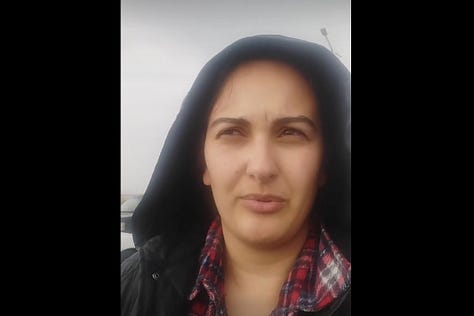
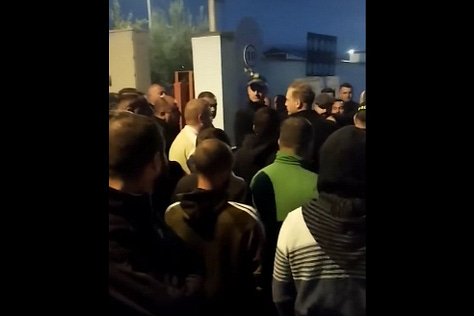
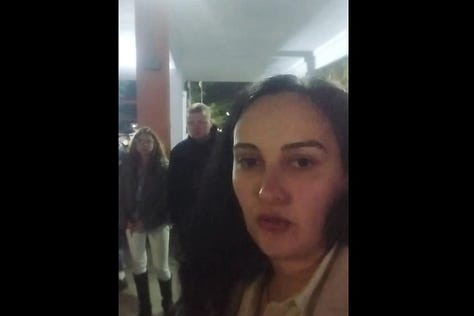
I attempted to contact various journalists and organizations, but unfortunately, none showed immediate interest. Our saving grace came from going live. I showed my children in the background; narrating the situation to the residents, urging them to mobilize and join us. I emphasized the potential danger to us and the others present.
Approximately five minutes after the live broadcast ended, cars began arriving, filled with families, friends, and neighbors, bearing food, drinks, and words of encouragement. I remain immensely proud of this response.
Women, particularly stay-at-home mothers, played a crucial role during this time. Without their involvement, I am uncertain how events would have unfolded. It is likely that our story would have reached its conclusion then and there.
As a working woman, mother, and community member, what personal challenges have you encountered in your activism? Are there any experiences you'd like to share?
At present, I am a work-from-home mom, which entails balancing work, childcare, and eco-activism. This demands a significant amount of time and energy. After the demonstrations, amidst numerous sleepless nights and heightened stress, I even found myself hospitalized; I experienced a heart attack on the bus, with my child present. Fortunately, everything turned out well, and I survived.
An initial challenge in our community organizing was the lack of female representation [in leadership positions]. I recall that during the organization of the first public meeting between the community and a local organization, the men initially did not allow me to speak, despite my being the organizer. However, their perception of me has since changed, and they now place their trust in me, albeit after considerable effort on my part.
As I am solely responsible for raising my children, I often have to bring them along with me to meetings and events. We advocate for their right to a safe and healthy environment, safeguarding their future. It is imperative that our actions prioritize safety, particularly concerning our lives and the lives of our children.
On one occasion, I invited mothers to join us with their children, emphasizing the need to create an environment that is safe for all, including our children. I firmly believe that a country that prides itself on its European identity and considers itself civilized should prioritize the safety and well-being of children and women.
There is a framework that puts forward that environmental justice is a feminist issue. The argument is that those who are least responsible for climate change through the destruction of the environment experience its greatest impact, with women, girls, and other marginalized groups most acutely impacted. Others have noted that women seem often to be at the forefront of environmental movements. Does gender feed into your understanding of your role in environmental activism?
As women, we possess significant power to contribute to positive change in the world. It has taken centuries for us to secure our rights, and even today, we have to continue to advocate for our equality in various fields.
Women inherently possess the foresight that the future requires; we have the capacity to envision and care for future generations. We recognize the critical importance of preserving forests and maintaining a clean environment for the benefit of future generations. Our concern extends beyond just our children of today; we hold a vision for the future.
We must advocate for our voices, our bodies, our independence, our choices, our children, our future, and our planet. Our unique perspectives as women foster solidarity among us, making it imperative for us to unite and support one another. In times of solidarity, we can accomplish more.
In what ways do you believe environmental movements can better support and empower female activists?
It is crucial for women like us to have access to specialized courses that can enhance our skills, as well as opportunities to connect with experienced activists and organizations. Furthermore, support with mental and physical health is essential. Active engagement in activism can pose significant challenges, and having resources for maintaining your well-being is invaluable.
How have things changed since you started, both for you and regarding the landfill?
My life has undergone significant changes; I find myself with less time, but I’ve gained a wealth of knowledge about environmental care and protection. I discovered a strength within myself that I didn’t know existed.
The community has placed a great deal of trust in me, not just concerning the landfill, but also in addressing broader problems in our settlements and asserting our rights more actively. Strangers often approach me to express their gratitude. A significant accomplishment for me is instilling a sense of hope in people, inspiring them to believe in the power of their voices and the potential for change through unity.
Regarding the landfill, we’ve made progress. Following the city mayor’s directives, a tender was initiated to explore alternative sites. Discussions have also begun about implementing a gas collection system and for the tendering of wastewater treatment plants, with expectations of a company taking that on soon. We were also promised that the area of landfilling [at Didi Lilo] would be reduced and that a new area for landfill would be found. However, we lack a monitoring mechanism at this stage to ensure these promises are fulfilled. Despite the challenges, we are steadily advancing, taking small but significant steps forward.


What are your hopes for the future of the Didi Lilo landfill?
I am hopeful that we will soon close the existing landfill and manage it in accordance with regulations. Installing gas collectors and water filtration systems is imperative: this is essential for safeguarding the health and right to life of the local population, as well as mitigating risks associated with international flights, and potential outbreaks of water and bird-borne diseases. It is also crucial to restore the local ecosystem, focusing on protecting indigenous plant species listed in the Red Book, whose existence is threatened by the presence of the current landfill.
What do you hope to achieve, personally and collectively, as an environmental activist in the coming years?
The path we have embarked upon will not be easy, and we are prepared to persist in this endeavor until we achieve our desired goal. We acknowledge the possibility that legal action may be necessary along the way. We also aim to raise awareness and promote environmental consciousness in the population.
Simultaneously, I intend to address smaller-scale issues such as water and sewage problems, as well as the maintenance of recreational areas and trees. However, my aspirations extend to long-term plans, particularly in the realm of environmental conservation. I trust that our determination and unity will remain steadfast, as they are essential prerequisites for success.
I hold firm to the belief in a greener future, recognizing that responsibility for the Earth lies in our hands.
Thank you so much Kristine. We wish you all the best.
Photographs: Tornike Mermanishvili, originally published on Chai Khana.
Edit: Anna Edgar






